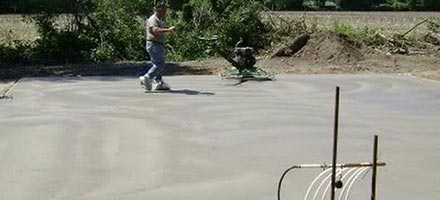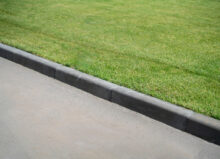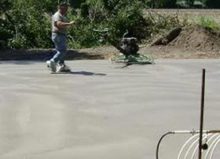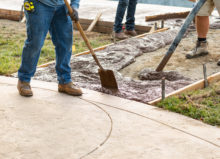How Thick Should a Concrete Parking Lot Be?

Concrete is becoming a popular alternative to asphalt. However, many companies and homeowners still have questions regarding the proper concrete parking lot installation. Find out the ideal thickness for your concrete parking lot, learn the benefits of choosing concrete and find a local concrete contractor who can provide you with a safe, reliable parking lot for years to come.
Parking Lot Thickness Guide
The exact recommended thickness for a concrete parking lot varies widely. Depending on your location, the amount of traffic and the number of large trucks that may be driving on your parking lot, the thickness can vary dramatically. From as little as four inches to 12 or more inches, the exact thickness will depend on your location, your traffic and local climate considerations.
Professional concrete parking lot designers use the ACI 330R-08, Guide for Design and Construction of Concrete Parking Lots. This technical graph and guidelines show the exact thickness needed based on the anticipated load and subbase strength. A professional will review your proposed parking lot location, work with you to determine the expected load and provide you with a quote based on the recommended thickness of your lot.
In most cases, however, six inches of concrete is a typical thickness that provides you with long-lasting support. For high-traffic areas that expect to see large trucks pulling through, plan on 12 inches of concrete. Some parking lots that see seasonal or light use are only four inches thick. As you can see, the exact amount varies based on a few factors, so it’s important to discuss these with an expert contractor. If you already have a gravel, dirt or asphalt parking lot, you can easily estimate the approximate load you experience on a daily basis. Otherwise, your contractor can help you determine the typical concrete thickness for your type of business or home.
Benefits of Concrete vs Asphalt
While concrete parking lot services may seem more expensive than asphalt parking lots, you can expect to save money throughout the lifetime of your parking lot. Concrete can last up to 30 years with proper care and typically lasts at least 20 years. You can expect some maintenance steps with concrete, but it’s typically easier to maintain and more rugged than an asphalt lot.
Asphalt, on the other hand, needs routine maintenance every five to seven years. Otherwise, you’ll see significant potholes, cracks and other deterioration that can affect your customer satisfaction levels.
A concrete investment allows you to avoid the continuous, costly maintenance of asphalt. Asphalt parking lots are far more likely to experience potholes due to freezing temperatures or experience warping due to hot temperatures. While the initial cost is less, over time you could end up paying more for your asphalt parking lot.
When you choose a professional concrete service you’ll enjoy a smooth, efficient parking lot. Many concrete and asphalt parking lots aren’t built with proper drainage and have low troughs that collect water. When your parking lot has standing water and experiences freezing temperatures, it can easily crack and buckle. Standing water dramatically reduces the lifespan of your parking lot, so be sure to choose a service provider who designs proper drainage for your lot.
Contact Your Local Concrete Contractor
For all your premier Michigan concrete contracting services, choose G&G Concrete and Construction. Our dependable team provides affordable, effective and environmentally sustainable solutions for all your concrete needs. Request a quote today or talk to our concrete experts to discuss the appropriate parking lot thickness for your particular project. Don’t settle for uneven, improperly drained concrete, but experience all the benefits of a professional concrete surface that lasts longer and provides convenient parking at your home or commercial location.








